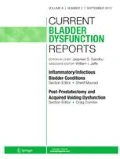Abstract
Purpose of Review
Multiple sclerosis is a common immune-mediated condition of the central nervous system. It remains one of the most disabling conditions affecting young people, and there is significant cost associated with managing this condition. Revisions of the diagnostic criteria have contributed to better identification and diagnosis of the condition, but consensus approaches to managing the condition are not fully established. Approaches to managing acute demyelination, chronic demyelination, and symptomatic treatments are reviewed.
Recent Findings
The most common treatment for acute demyelination continues to be the use of corticosteroids via the intravenous or oral routes. Duration of corticosteroid treatment is variable, but high dose treatment is commonly administered over 3 to 7 days. There is a growing arsenal of medications to treat chronic demyelination that includes the use of self-administered injections, daily oral immunomodulation, and intravenous infusions each with their own set of pros and cons. While it is important to address both acute and chronic demyelination, symptomatic treatment should always be addressed to increase the overall quality of activities of daily living.
Summary
Individuals with multiple sclerosis are all phenotypically different, and careful consideration should be used to individualize therapy for those living with this disease state. As with other autoimmune conditions, not all patients with multiple sclerosis will require long-term chronic therapy. However, chronic immunomodulatory treatments should be offered to all patients to prevent future disease activity until reliable biomarkers are established. Much remains unknown about the pathophysiology of this condition, but advancements in treatment suggest the future is promising for those affected by this condition.
Similar content being viewed by others
References
Papers of particular interest, published recently, have been highlighted as: • Of importance •• Of major importance
Hirtz D, Thurman DJ. How common are the “common” neurologic disorders? Neurology. 2007;68:326–37.
Olek M & Mowry E (2018). Pathogenesis and epidemiology of multiple sclerosis. Up to date.
Hartung DM, Bourdette DN, Ahmed SM, Witham RH. The cost of multiple sclerosis drugs in the US and the pharmaceutical industry: Too big to fail? Neurology. 2015;84(21):2185–92.
McDonald WI, Compston A. Recommended diagnostic criteria for multiple sclerosis: guidelines from the international panel on the diagnosis of multiple sclerosis. Ann Neurol. 2001;50:121–7.
• Polman C, Reingold SC, Banwell B. Diagnostic Criteria for Multiple Sclerosis: 2010 Revision to the McDonald criteria. Ann Neurol. 2011;69:292–302 This article is the most recent attempt to give consensus guidelines for treatment of MS.
Lublin FD, Reingold SC. Defining the clinical course of multiple sclerosis: the 2013 revisions. Neurology. 2014;83:278–86.
Martinelli V, Rocca MA. A short-term randomized MRI study of high-dose oral vs intravenous methylprednisolone in MS. Neurology. 2009;73:1842–8.
Le Page E, Veillard D, et al. Oral versus intravenous high-dose methylprednisolone for treatment of relapses in patients with multiple sclerosis (COPOUSEP): a randomised, controlled, double-bling, non-inferiority trial. Lancet. 2015;386:974–81.
Thompson AJ, Kennard C. Relative efficacy of intravenous methylprednisolone and ACTH in the treatment of acute relapse in MS. Neurology. 1989;39:969–71.
Weinshenker BG, O'Brien PC, Petterson TM, Noseworthy JH, Lucchinetti CF, Dodick DW et al. A randomized trial of plasma exchange in acute central nervous system inflammatory demyelinating disease. Ann Neurol. 1999;46(6):878–86.
Rae-Grant A, Day GM, et al. Practice guideline recommendations summary: Disease-modifying therapies for adults with multiple sclerosis: American Academy of Neurology. Neurology. 2018;90:777–88.
Heine M, van de Ingrid P (2015). Exercise therapy for fatigue in multiple sclerosis. Cochrane database of systematic reviews.
•• Koppel BS, Brust JC, Fife T, et al. Systematic review: efficacy and safety of medical marijuana in selected neurologic disorders: report of the Guideline Development Subcommittee of the American Academy of Neurology. Neurology. 2014;82:1556–63 Good review that demonstrates both oral and IV steroids are effective.
Rice J, Cameron M. Cannabinoids for treatment of MS symptoms: state of the evidence. Curr Neurol Neurosci Rep. 2018;18(8):50.
Russel R, Black R, & Sherriff JB (2018). Dietary responses to a multiple sclerosis diagnosis: a qualitative study. Eur J Clin Nutr.
Lombardi V, De Meirleir K, Subramanian K. Nutritional modulation of the intestinal microbiota: future opportunities for the prevention and treatment of neuroimmune and neuroinflammatory disease. J Nutr Biochem. 2018;61:1–16.
Author information
Authors and Affiliations
Corresponding author
Ethics declarations
Conflict of Interest
Jaison Grimes declares that he has no conflict of interest.
Human and Animal Rights and Informed Consent
This article does not contain any studies with human or animal subjects performed by any of the authors.
Additional information
This article is part of the Topical Collection on Neurogenic Bladder
Rights and permissions
About this article
Cite this article
Grimes, J. A Review of Multiple Sclerosis for Urologists and Urogynecologists with an Emphasis on Management. Curr Bladder Dysfunct Rep 13, 230–233 (2018). https://doi.org/10.1007/s11884-018-0498-8
Published:
Issue Date:
DOI: https://doi.org/10.1007/s11884-018-0498-8


